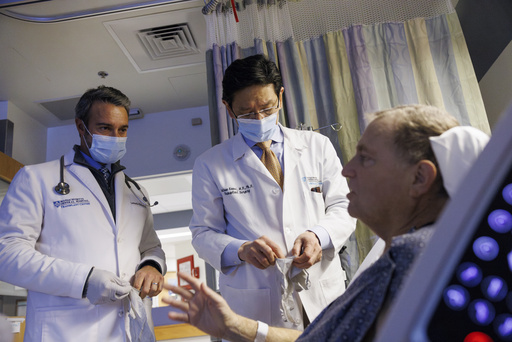
A man from New Hampshire, Tim Andrews, has achieved a significant milestone in medical history by becoming one of the first individuals to receive a kidney transplant from a pig. At 66 years old, Andrews underwent this groundbreaking procedure after dedicating months to improving his overall health to qualify for a pilot study examining this innovative, yet highly experimental treatment.
Massachusetts General Hospital announced on Friday that Andrews is now free from the grip of dialysis, having had the surgery on January 25. Remarkably, he was able to leave the hospital just a week later due to his exceptional recovery. “Waking up in the recovery room felt like being a new man,” he shared.
Andrews’ transplant signifies a crucial moment in the ongoing exploration of animal-to-human organ transplants, which aim to mitigate the critical shortage of donor organs. Prior attempts at animal organ transplantation—specifically two pig hearts and two pig kidneys—yielded limited success. However, the recent achievements of another recipient, a woman from Alabama who received a pig kidney at NYU Langone Health, have injected new optimism into the field. She has thrived for over two and a half months post-surgery, encouraging researchers to shift focus from isolated trials to more systematic investigations.
As doctors closely monitor Andrews’ recovery, Massachusetts General Brigham has already received FDA approval to proceed with two additional transplants using gene-edited pig kidneys provided by eGenesis for their pilot study. In a further development, United Therapeutics has gained FDA clearance to conduct a clinical trial that is set to be the first of its kind globally in xenotransplantation. The trial will start with six initial patients, and if their progress is satisfactory over the next six months, the study could expand to accommodate up to 50 additional patients.
Dr. Tatsuo Kawai of Massachusetts General, who led Andrews’ surgery, emphasized the significance of this research, stating, “We are venturing into uncharted territory.” He expressed optimism based on lessons gleaned from previous animal studies and human cases, aiming for long-term survival of kidney transplants reaching beyond two years.
To tackle the ongoing transplant crisis—where over 100,000 individuals in the U.S. are on the kidney transplant list, many of whom face dire circumstances—scientists are genetically modifying pigs to make their organs more compatible with human biology. Andrews’ own kidney failure approximately two years ago led to chronic fatigue and severe complications from dialysis treatments, which can often take years to find suitable matches for organ transplants. The wait can last seven years or more for individuals of Andrews’ blood type, making him increasingly desperate for alternative solutions as he dealt with diabetes and prior heart issues.
Driven by a sense of urgency, Andrews reached out to Massachusetts General, eager to explore the possibility of receiving a pig kidney transplant. “I was ready to do anything. Just give me the list, and I’ll follow it,” he stated. Doctors soon realized he had a long journey ahead. He was frail from diabetes, which caused a slow-healing ulcer on his foot. After dedicating himself to intense physical therapy, he returned six months later, significantly lighter and full of energy. “He was just a different person,” recalled Dr. Leonardo Riella, who assessed Andrews’ progress.
As Andrews prepared for the surgery, doubts lingered. To ease his apprehension, he connected with Towana Looney, the first recipient of a pig kidney, sharing prayers and reassurance about the process. Following the transplant, doctors observed the kidney turned a healthy pink and began normal functioning almost immediately, producing urine without any rejection signs. Andrews spent his recovery week at a nearby hotel for follow-ups but looks forward to returning home soon.
Dr. Robert Montgomery, a transplant surgeon at NYU, noted that patients in studies like Andrews’ are typically those who stand to benefit most from early xenotransplant options—not yet severely affected by lengthy dialysis treatments, yet at risk of not surviving long enough to wait for a human organ.
As Andrews embarks on this new chapter, he remains cautiously hopeful, understanding that even if the pig kidney were to fail, he would still qualify for a human transplant without having to start his waiting period anew. Now, he is motivated to share his journey and instill hope in others facing similar challenges. “I want to return to my dialysis clinic and tell people that there is hope. Living without hope isn’t good for anyone,” he said.

